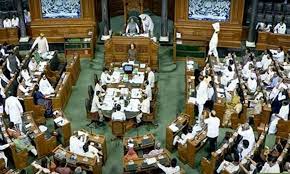BJP selects CMs in MP, Rajasthan, and Chhattisgarh to balance the dynamics of caste
In addition to carefully balancing caste considerations, the Bharatiya Janata Party (BJP) aimed to effect a generational shift this week by appointing three new faces as chief ministers in Madhya Pradesh, Rajasthan, and Chhattisgarh as part of its heartland political strategy ahead of the 2024 Lok Sabha elections.

In all three of the heartland states where it had won a stunning victory earlier this year, the party appointed fresh faces, albeit they took care to designate deputy chief ministers who would appease the main caste groupings. According to observers, this might benefit the party in maintaining the caste-neutral rainbow Hindu coalition that it established en route to winning a second term in 2019.
The party’s stunning wins in these states had sparked wild rumors regarding the top positions. This week, when the mystery around the BJP’s internal discussions lifted, a well-considered social engineering plan that aimed to connect with important communities—tribals, backward, upper-castes, and Dalits—was exposed. The party has already gained 62 of the 65 seats in the three provinces, making this a stronghold in 2019. However, the party may benefit from a fresh campaign outside of the heartland and expand its base of support in these areas for the general elections scheduled for the summer of 2019.
In Chhattisgarh, a state where the Congress threw away a massive mandate five years before, the party chose Vishnu Deo Sai, a prominent tribal leader, to be chief minister. People from the tribe had overwhelmingly supported the party; out of the 29 seats set aside for Scheduled Tribes, the BJP won 17, an increase from the three it had won in 2018. About one-third of the state’s population is tribal, and Sai is from the Kanwar tribe, which is the second-largest tribe after the Gonds.
“The BJP wants to make sure that the tribal people understand that they are a party that represents them in the Lok Sabha polls and other state elections like Jharkhand, following the Congress’s promotion of the OBC narrative. A top BJP official had said, “This is the second biggest appointment after the nomination of Droupadi Murmu as President of India.” 47 seats in the Lok Sabha are set aside for Scheduled Tribes, a group that the party has been actively courting over the last year, much like it did with Dalits in the run-up to the 2019 elections.
According to persons with knowledge of the situation, two more deputy chief ministers are probably going to be nominated. Arun Sao, the head of the state unit and a prominent member of the other backward classes (OBC) group, is probably one of them. The Sahus are a bellwether community that voted for the Congress in 2018 but returned to the BJP this time.
The party’s selections for Madhya Pradesh also clearly reflected the lines of caste. The BJP selected to replace four-time chief minister Shivraj Singh Chouhan with Mohan Yadav, a well-known leader of the Other Backward Classes. By appointing him, the party guaranteed that its hold on the OBCs, who make up the majority of Madhya Pradesh’s voters and the backbone of the BJP’s national electoral alliance, would endure.
Viewpoint: A mandate for the aspirational politics of the BJP
Furthermore, the BJP made it easier to get traction with the Yadav population in the neighboring states by selecting a candidate from that group, which is more prevalent in Uttar Pradesh and Bihar than in Madhya Pradesh.
The party was also cognizant of its other important constituency, as seen by its pick of deputy chief ministers: Brahmin face and departing public relations minister Rajendra Shukla, and Dalit face and senior politician Jagdish Devda. Last week, the BJP defied expectations by winning 26 out of 35 seats set aside for scheduled castes, up from 18 in 2018.
“The choice of the chief minister and deputy chief ministers has been taken by considering many things like representation of the region, ability to achieve goals, leadership quality, future aspects and others not only caste,” said BJP spokesman Rajneesh Agrawal. It is incorrect to state that the party prioritized a single caste issue.
And by concentrating on its largest voting bloc—the higher castes—when the statement from Rajasthan was made on Tuesday, it completed the circle on its caste policy. Bhajan Lal Sharma, a newly elected MP, was designated the CM. However, the party was mindful to choose another member of the royal family, Diya Kumari, as deputy chief minister in an attempt to reach out to the powerful Rajput community, even as it seemed to move beyond two-time chief minister Vasundhara Raje. Additionally, Prem Chand Bairwa, a prominent leader in the community, was the other deputy chief minister in a state where the party won 22 of the 34 seats set aside for scheduled castes.







